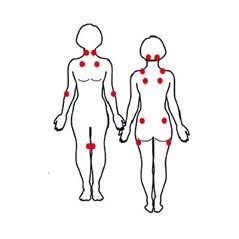Fibromyalgia
Fibromyalgia (FMS or “fibro”) is a ‘chronic’ (long-lasting) widespread pain condition. It often begins slowly, developing over months or even years of increasingly severe symptoms. There is often no trigger, but in some cases one is recognised eg. accidents, stress and acute illness.
Some people appear vulnerable to developing the condition, perhaps due to their family history, having a personal history of depression/anxiety or previous ‘adverse life events’.
People with fibromyalgia typically have multiple symptoms, but particularly pain, which may be widespread and associated with certain more tender areas (‘tender points’) which were previously needed to make a diagnosis but are now no longer needed. In addition, people may complain of fatigue with non-restorative sleep, depression and anxiety, ‘fibro fog’, morning stiffness and other symptoms including: nausea/vomiting/bloating/IBS/irritable bladder/painful/periods/dizziness/dizzy/hot & cold.
Some people appear vulnerable to developing the condition, perhaps due to their family history, having a personal history of depression/anxiety or previous ‘adverse life events’.
People with fibromyalgia typically have multiple symptoms, but particularly pain, which may be widespread and associated with certain more tender areas (‘tender points’) which were previously needed to make a diagnosis but are now no longer needed. In addition, people may complain of fatigue with non-restorative sleep, depression and anxiety, ‘fibro fog’, morning stiffness and other symptoms including: nausea/vomiting/bloating/IBS/irritable bladder/painful/periods/dizziness/dizzy/hot & cold.
This image shows the 18 classic ‘tender points’ of fibromyalgia. There is an overlap with Chronic Fatigue Syndrome, and the management is similar. There are no diagnostic tests for fibromyalgia, which relies on excluding any other disease through careful history taking, examination and a screen of diagnostic tests.
The management has to be holistic, with advice, education and input from a variety of clinicians and complementary therapists. Drug therapy is only a small part of the overall management of fibromyalgia.
